小学五年级英语下册语法
2023年苏教版英语五年级下册第七单元语法知识点

五下Unit7 语法知识点
1. 中国老式节日前要加the
the Spring Festival/ the Lantern Festival/ the Double Seventh Festival…
2. 介词on, in, at 旳使用方法
月份前用in in January / in March...
表达一段时间前用in in winter …
详细到某一天用on on the second Sunday of May, on the first of May
on Monday / on Tuesday…
具有Day旳节日前用on on Mother’s Day, on Teachers’ Day…festival 前用at at this festival / at the Dragon Boat Festival ...
3. 日期旳体现措施
the +序数词+of+月份
the thirty-first of October
4. 表达“…旳”
物主代词:my, your, her, his, their, its
名词所有格:Su Hai’s, Mike’s
用of 来表达:the picture of Helen = Helen’s picture
the third months of a year 一年中旳第三个月份
5. 有关天气旳提问
What’s the weather like ? = How is the weather ?
6. 有关when / what day 旳使用方法区别It is Friday . What day is it ?
It is on Friday. When is it ?。
五年级英语下册重点句型

五年级英语下册重点句型基本句型:1. 询问喜欢哪个季节:⑴--- Which season do you like best? 你最喜欢哪个季节?---I like +季节+ best. (例:Ilikespring∕summer∕fall∕winter best)---或:I like summer, because I can swim inthe sea.⑵--- Whatis your favourite season? 你最喜爱的季节是什么?--- Spring∕summer∕fall∕winter is myfavourite season.2. 询问天气:--- What is the weather like in fall inBeijing? 北京秋天的天气是怎么样的?--- It is sunny and cool.3. 询问理由:--- Why do you like winter best? 为什么你最喜欢冬天?--- Because I can play with snow and make asnowman.4. 询问想要做什么--- What would you like to do?--- I’d like to climb∕play sports…… ( I’d = I would )5. 询问具体季节--- What season is it in March in Beijing? 北京的三月份是什么季节?--- It is spring.6. 询问能做什么--- What can I do there? 我在那里能做什么?--- You can go to the Great Wall. 你可以去长城。
7. 询问接下来打算去哪里?( be going to一般将来时)--- Where are you going on vacation? 假期你打算去哪里?--- I am going toCanada. 我将要去加拿大。
人教版五年级英语下册重点句型及语法

人教版五年级英语下册重点句型及语法第一单元1、其他日常活动:eat breakfast 吃早饭 eat lunch吃午饭 eat dinner 吃晚饭get up起床 go to bed 上床睡觉 wash my clothes 洗我的衣服watch TV看电视 go swimming 去游泳 go running去跑步do homework 做作业 do kungfu练武术 play ping-pong打乒乓球play football踢足球 play basketball打篮球 play the pipa弹琵琶play music 演奏音乐 finish class 结束上课 start class 开始上课in the water/sea 在水里/在海里 is good at 擅长 get off 逃脱 lots of 许多2、频度副词。
always总是,一直(100%)usually通常(80%) often 经常(60%)sometimes(30%)有时3、疑问词。
when什么时候 why 为什么 what 什么重点句型。
1、询问别人什么时候做某事的句型及回答。
句型结构:问:When do you+动词短语原形+其他?(你/你们什么时候做某事?)答:I/we(+频度副词)+动词短语原形+at+具体时间(我/我们通常在几点做某事。
)例:问:When do you go to bed?(你什么时候上床睡觉?)答:I go to bed at 9:00p.m (我晚上9点上床睡觉。
)注意:当主语是第三人称单数(he,she,it,单个人名或单数名词)时,助动词do要变成doe s,句型结构是:when does+主语(第三人称单数)+动词短语原形+其他?2、询问别人周末做什么的句型及回答。
句型结构:问:What do you do on the weekend?(你周末做什么?)答:I(+频度副词)+动词(短语)+其他。
小学五年级英语下册语法
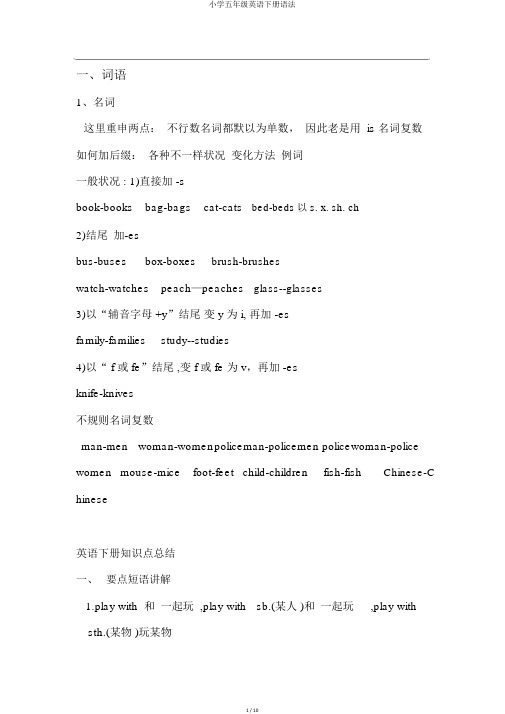
一、词语1、名词这里重申两点:不行数名词都默以为单数,因此老是用 is 名词复数如何加后缀:各种不一样状况变化方法例词一般状况 : 1)直接加 -sbook-books bag-bags cat-cats bed-beds以 s. x. sh. ch2)结尾加-esbus-buses box-boxes brush-brusheswatch-watches peach—peaches glass--glasses3)以“辅音字母 +y”结尾变 y 为 i, 再加 -esfamily-families study--studies4)以“ f 或 fe”结尾 ,变 f 或 fe 为 v,再加 -esknife-knives不规则名词复数man-men woman-women p oliceman-policemen policewoman-police women mouse-mice foot-feet child-children fish-fish Chinese-C hinese英语下册知识点总结一、要点短语讲解1.play with 和一起玩 ,play with sb.(某人 )和一起玩,play withsth.(某物 )玩某物eg. Lucy and Lily are playing with their mother.Lucy and Lily are playing with their doll.2.a lot of 好多 a lot of =lots of+可数名词复数或不行数名词eg. 同义句变换=There are There are a lot of apples on the table.apples on the table.3. how often 多久一次,how often 是一个特别疑问词,就频率发问。
英语表示频率的词:一次:once 两次:twice 特别其他次数:基数词 +times 构成比方: 8 次e.g. --How often do you go to the library?eight timesI go to the library once a week.(注:如就划线部分发问,应用特殊疑问词 how often)4.how many 多少 ,how many/much 就数目发问 .how many+可数名词; how much +不行数名词e.g.-- How many boys are there in your class?There are 40 boys in my class.How much water is there in the bottle? There is a little water in the bottle.5.be good at 善于 at 后可加名词或动词。
小学五年级下英语语法总结
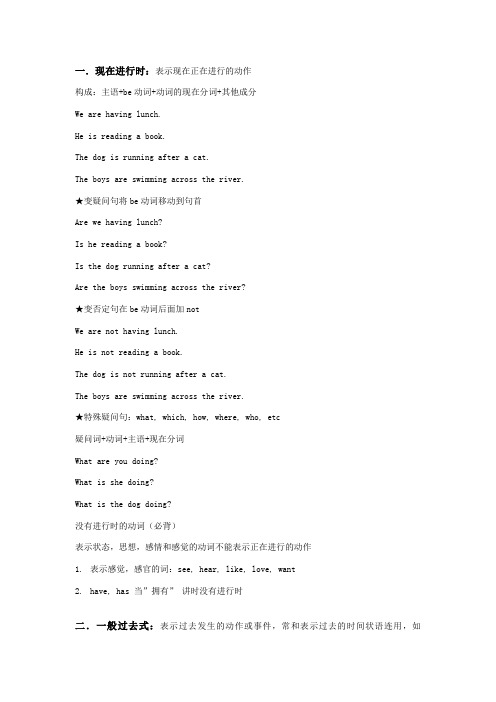
一.现在进行时:表示现在正在进行的动作构成:主语+be动词+动词的现在分词+其他成分We are having lunch.He is reading a book.The dog is running after a cat.The boys are swimming across the river.★变疑问句将be动词移动到句首Are we having lunch?Is he reading a book?Is the dog running after a cat?Are the boys swimming across the river?★变否定句在be动词后面加notWe are not having lunch.He is not reading a book.The dog is not running after a cat.The boys are swimming across the river.★特殊疑问句:what, which, how, where, who, etc疑问词+动词+主语+现在分词What are you doing?What is she doing?What is the dog doing?没有进行时的动词(必背)表示状态,思想,感情和感觉的动词不能表示正在进行的动作1.表示感觉,感官的词:see, hear, like, love, want2.have, has 当”拥有”讲时没有进行时二.一般过去式:表示过去发生的动作或事件,常和表示过去的时间状语连用,如yesterday, last night, the day before yesterday, 3 days ago构成:含有be动词的句子,将动词变为过去式,am, is 的过去式为was,are的过去式为wereI was at the butcher’s.You were a student a year ago.The teacher was very beautiful ten years ago.★变疑问句将be动词移动到句首Were you at the butcher’s?Were you a student a year ago?Was the teacher very beautiful ten years ago?★变否定句在be动词后面加notI was not at the butcher’s.You were not a student a year ago.The teacher was not very beautiful ten years ago.★肯定回答/否定回答Yes, I was. / No, I was not.Yes, you were. / No, you were not.Yes, he/she was. / No, he/she was not.★特殊疑问句What did you do?(必背)不含有be动词的句子,将动词变为过去式I finished my homework yesterday.The boy went to a restaurant.The Sawyers lived at King Street a year ago.★变疑问句在句首加did,动词变为原型Did you finish your homework yesterday?Did the boy go to a restaurant?Did the Sawyers live at King Street a year ago?★变否定句在主语和动词之间加did notI did not finish my homework yesterday.The boy did not go to a restaurant.The Sawyers did not live at King Street a year ago.★肯定回答及否定回答Yes, I did. No, I didn’t.Yes, he did. No, he didn’t.Yes, they did. No, they did not.三.过去完成时用法:在过去的时间里,两个动作中,发生在前的那个动作要用过去完成时。
外研社小学英语一起小学5五年级下语法总结及练习题

外研社五年级下语法总结及练习题I. 一般现在时A. 功能:1.表示事物或人物的特征、状态。
如:The sky is blue.天空是蓝色的。
2.表示经常性或习惯性的动作。
如:I get up at six every day.我每天六点起床。
3.表示客观现实。
如:The earth goes around the sun.地球绕着太阳转。
B. 构成:1. be动词:主语+be(am, is, are)+其它。
注意:(我用am,你用are,三单is,复数are。
)肯定句:主语+be+其它. 如:He is a worker. 他是工人。
否定句:主语+ be + not +其它. 如He is not a worker.他不是工人。
一般疑问句:Be +主语+其它? 如:Is he a worker?特殊疑问句:疑问词+一般疑问句? Where is your bike?2.行为动词:主语+行为动词(+其它).如:We study English.我们学习英语。
注意:(当主语为第三人称单数(he, she, it)时,要在动词后加"-s"或"-es"。
如:Mary likes Chinese.玛丽喜欢汉语。
肯定句:主语+动词原形(+其它). 如:I like bread.否定句:主语+ don't( doesn't ) +动词原形(+其它)。
如:I don't like bread.当主语为第三人称单数时,要用doesn't构成否定句。
如:He ofter plays football. He doesn't often play football.一般疑问句:Do( Does ) +主语+动词原形+其它?如:Do you often play football?- Yes, I do. / No, I don't.当主语为第三人称单数时,要用does构成一般疑问句。
五年级英语下册知识讲义-语法精讲(Units 1-3 复习)-湘少版
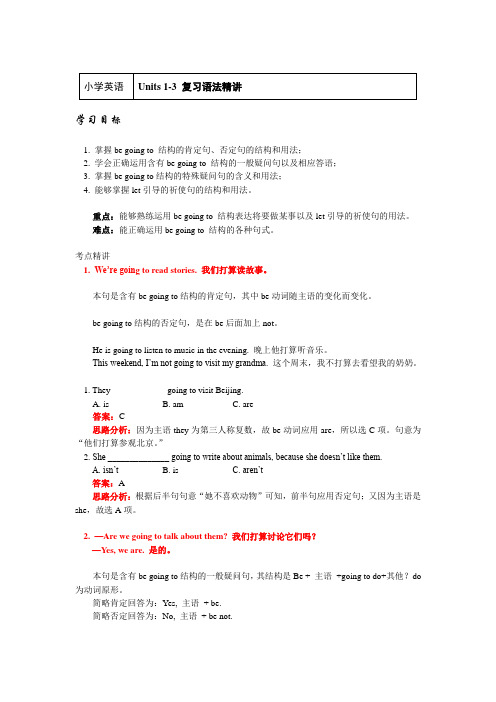
学习目标1. 掌握be going to 结构的肯定句、否定句的结构和用法;2. 学会正确运用含有be going to 结构的一般疑问句以及相应答语;3. 掌握be going to结构的特殊疑问句的含义和用法;4. 能够掌握let引导的祈使句的结构和用法。
重点:能够熟练运用be going to 结构表达将要做某事以及let引导的祈使句的用法。
难点:能正确运用be going to 结构的各种句式。
考点精讲1.We’re goin g to read stories. 我们打算读故事。
本句是含有be going to结构的肯定句,其中be动词随主语的变化而变化。
be going to结构的否定句,是在be后面加上not。
He is going to listen to music in the evening. 晚上他打算听音乐。
This weekend, I’m not going to visit my grandma. 这个周末,我不打算去看望我的奶奶。
1. They ____________ going to visit Beijing.A. isB. amC. are答案:C思路分析:因为主语they为第三人称复数,故be动词应用are,所以选C项。
句意为“他们打算参观北京。
”2. She ______________ going to write about animals, because she doesn’t like them.A. isn’tB. isC. aren’t答案:A思路分析:根据后半句句意“她不喜欢动物”可知,前半句应用否定句;又因为主语是she,故选A项。
2.—Are we going to talk about them? 我们打算讨论它们吗?—Yes, we are. 是的。
本句是含有be going to结构的一般疑问句,其结构是Be + 主语+going to do+其他?do 为动词原形。
PEP五年级英语下册重点句型
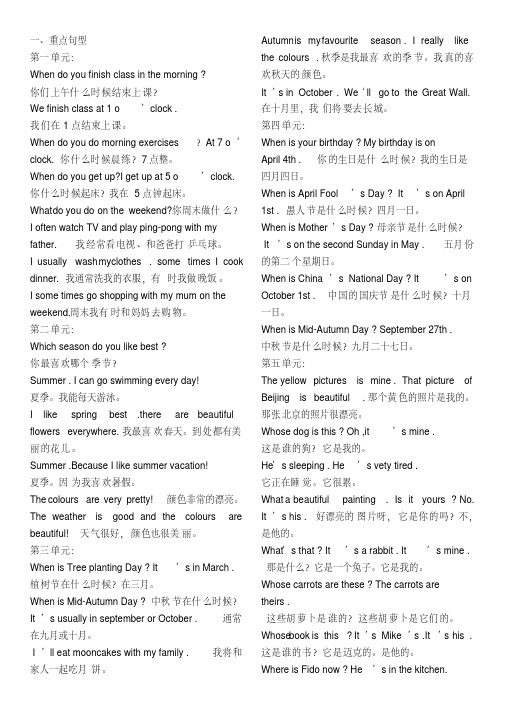
一、重点句型第一单元:When do you finish class in the morning ?你们上午什么时候结束上课?We finish class at 1 o’clock .我们在1点结束上课。
When do you do morning exercises ?At 7 o’clock.你什么时候晨练?7点整。
When do you get up?I get up at 5 o’clock. 你什么时候起床?我在5点钟起床。
What d o you do on the weekend ?你周末做什么?I often watch TV and play ping-pong with my father. 我经常看电视、和爸爸打乒乓球。
I usually wash my c lothes . some times I cook dinner.我通常洗我的衣服,有时我做晚饭。
I some times go shopping with my mum on the weekend.周末我有时和妈妈去购物。
第二单元:Which season do you like best ?你最喜欢哪个季节?Summer . I can go swimming every day!夏季。
我能每天游泳。
I like spring best .there are beautiful flowers everywhere.我最喜欢春天。
到处都有美丽的花儿。
Summer .Because I like summer vacation!夏季。
因为我喜欢暑假。
The colours are very pretty! 颜色非常的漂亮。
The weather is good and the colours are beautiful!天气很好,颜色也很美丽。
第三单元:When is Tree planting Day ? It’s in March . 植树节在什么时候?在三月。
五年级下册英语语法知识点语法知识

五年级下册英语语法知识点语法知识1.近义词eatbreakfast—havebreakfasteatlunch—haveluncheatdinner—havedinnerplaysports—dosportsusually—often复数形式:policeman—policemenpolicewoman—policewomen现在分词:tell—telling三单:say—says同义句:Whatdoyoudo?---Whatareyou?你是干什么的?2、频度的副词:always总是,一直usually通常,常常often经常sometimes有时候4、介词后跟表示时间的词语时,表示在某年、某月、某个季节,某个时候(在上午,在下午,在晚上)用in;表示在某一天,在星期几用on,在具体的几点几分用at.5、too用1.2.3.42)2(2)?以以t(4)?(5)?以y结尾的整十数,在变为序数词时,将y变为ie,?再加th.?如twenty—twentieth??(6)20以上的两位数,变为序数词时,十位数不变,只将个位上的数变为序数词。
如:twenty-one--—--twenty-first?,?twenty-two——twenty-second?,??thirty-four——thirty-fourth??(7)序数词的简写形式为表示该词的阿拉伯数字加上该单词的最后两个字母,最后两个字母要变成上标格式。
如:first—1st?,?second—2nd?,??third—3rd?,??fourth—4th?.?twentieth—20th?3.?回答When?is?your?birthday?这个问题,如果只说明生日在几月份,在月份前用in.如?My?birthday?is?in?July.?如果要具体说明生日是在几月几日,则要把in去掉,直接用is,或者在is后加on。
如My?birthday?is?June?9th.?或My?birthday?is?on?June?9th?.?4.注意区分两个句子:What?day?is?it?today??今天星期几??What’s?the?date?today??今天是几月几日??5.?根据要求写单词:?make?(现在分词)---making.????send(?现在分词)---sending.?6.句子:?How?many?birthdays?are?in?October??有几个人的生日在十月??????There?are?3.?7.?My?birthday?is?in?February?.(变为一般疑问句)---Is?your?birthday?in?February?9?1”或者“2.34(加ing(1)(2)?write—(3)?ing.?五单元主要知识点:?1、在英语中,当表示妈妈时,无论是人类妈妈还是动植物的妈妈,都可以用she?.?而表示婴儿时,也都可以用it.?2、系动词be?的用法:我是am你是are,?is跟着他她它。
【译林版】英语五年级下册语法知识要点

译林版英语五年级下册语法知识要点1.当主语是第三人称单数时,动词用第三人称单数形式(+s/es/去y加ies) have——has go——goes do——does brush——brushes wash——washes catch——catches watch——watches teach——teaches fly——flies study——studies carry——carries try——tries play——plays buy——buys当主语是其他人称或复数时,动词用原型。
2.疑问句中,当主语是第三人称单数时,用助动词does,后面动词用原型。
疑问句中,当主语是其他人称或复数时,用助动词do,后面动词用原型。
3.否定句中,当主语是第三人称单数时,用助动词doesn’t,后面动词用原型。
否定句中,当主语是其他人称或复数时,用助动词don’t,后面动词用原型。
4.should/shouldn’t后面用动词原型。
can/can’t后面用动词原型。
let后面用动词原型。
5.看到now, look, listen,句子用现在进行时态be动词后面加现在分词(+ing/去e加ing/双写尾字母加ing)like后面用动名词(+ing/去e加ing/双写尾字母加ing)。
go后面用动名词。
be good at后面用动名词。
lesson前面用动名词。
fight——fighting play——playing draw——drawing come——coming dance——dancing write——writing make——making skate——skating make——making have——having ride——riding swim——swimming run——running sit——sitting chat——chatting put——putting shop——shopping6.动词(let/show/give/visit)后面加宾格。
外研社三起小学五年级英语下册知识点汇总
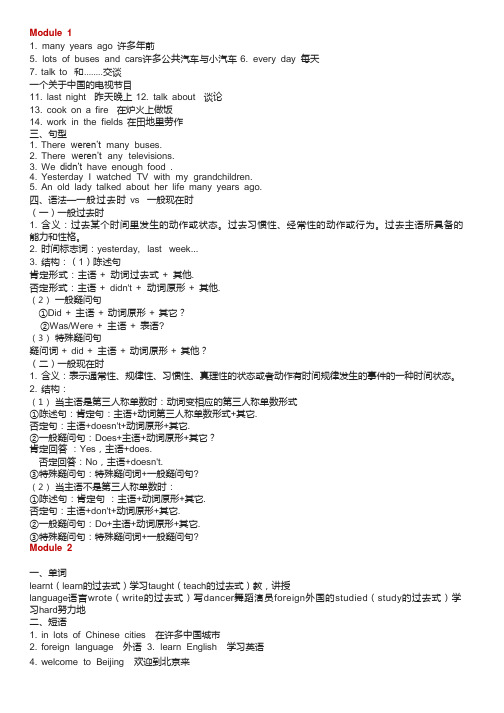
Module 11. many years ago 许多年前5.lots of buses and cars许多公共汽车与小汽车6.every day 每天7. talk to 和........ 交谈一个关于中国的电视节目11. last night 昨天晚上12. talk about 谈论13. cook on a fire 在炉火上做饭14. work in the fields 在田地里劳作三、句型1. There weren’t many buses.2. There weren’t any televisions.3. We didn’t have enough food .4. Yesterday I watched TV with my grandchildren.5. An old lady talked about her life many years ago.四、语法—一般过去时vs 一般现在时(一)一般过去时1. 含义:过去某个时间里发生的动作或状态。
过去习惯性、经常性的动作或行为。
过去主语所具备的能力和性格。
2. 时间标志词:yesterday,last week...3. 结构:(1)陈述句肯定形式:主语+ 动词过去式+ 其他.否定形式:主语+didn't +动词原形+ 其他.(2)一般疑问句①Did + 主语+ 动词原形+ 其它?②Was/Were +主语+ 表语?(3)特殊疑问句疑问词+ did + 主语+ 动词原形+ 其他?(二)一般现在时1. 含义:表示通常性、规律性、习惯性、真理性的状态或者动作有时间规律发生的事件的一种时间状态。
2. 结构:(1)当主语是第三人称单数时:动词变相应的第三人称单数形式①陈述句:肯定句:主语+动词第三人称单数形式+其它.否定句:主语+doesn't+动词原形+其它.②一般疑问句:Does+主语+动词原形+其它?肯定回答:Yes,主语+does.否定回答:No,主语+doesn't.③特殊疑问句:特殊疑问词+一般疑问句?(2)当主语不是第三人称单数时:①陈述句:肯定句:主语+动词原形+其它.否定句:主语+don't+动词原形+其它.②一般疑问句:Do+主语+动词原形+其它.③特殊疑问句:特殊疑问词+一般疑问句?Module 2一、单词learnt(learn的过去式)学习taught(teach的过去式)教,讲授language语言wrote(write的过去式)写dancer舞蹈演员foreign外国的studied(study的过去式)学习hard努力地二、短语1. in lots of Chinese cities 在许多中国城市2. foreign language 外语3. learn English 学习英语4. welcome to Beijing 欢迎到北京来5. make a cake 做蛋糕6. do homework 做家庭作业7. in his class 在他的班级8. a good pupil 一个好学生9. study hard 努力学习10. an English teacher 一位英语老师11. walk to school 走路去学校12. by school bus 乘坐校车三、句型1. 询问他人做过某事的句型及回答例:Did she learn any foreign languages?问:Did+主语+动词原形+其他?答:Yes, 人称代词主格+did.No,人称代词主格+didn’t.2. 描述他人做过某事例:She learnt English.主语+动词过去式+其他.3. 描述他们现在在做某事例:He is learning English now.主语+ be + v.-ing + 其他.Module 3一、单词hamburger汉堡包English英国(式)的breakfast早餐,早饭lunch午餐,午饭sandwich三明治fish and chips炸鱼加炸薯条traditional传统的dish食品;菜肴very much很,非常gave(give的过去式)给tonight今夜,今晚二、短语1. h ave got 拥有2. a n e-mail from Lingling一封来自玲玲的电子邮件3.about English food 关于英国食物4. h ave an English breakfast 吃了一顿英式早餐5. h ave …for lunch 吃....... 作为午餐6. a traditional English dinner 一顿传统的英式晚餐7. v ery different 非常不同8.give …to… 把......给......9. a t school 在学校10. cook Chinese food for Lingling 为玲玲做中式食物11. b e going to 打算12.tell a story 讲故事三、句型1、描述吃过某些食物:主语+had +食物名称+其他Yesterday she had an English breakfast.昨天她吃了一顿英式早餐。
译林版五年级英语下册语法知识点总结
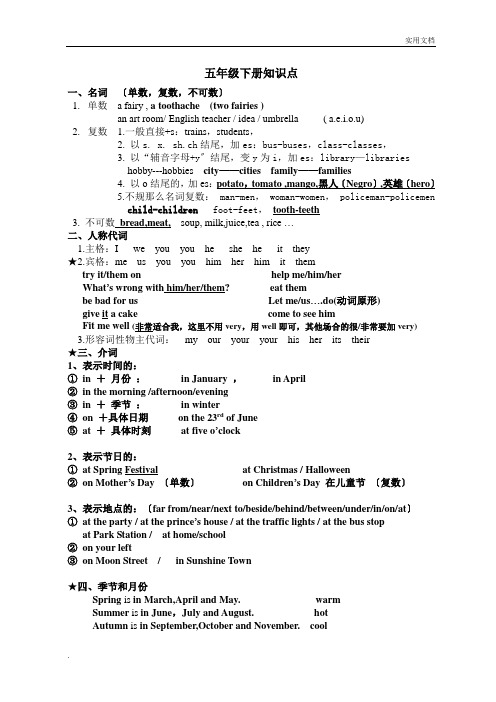
五年级下册知识点一、名词〔单数,复数,不可数〕1.单数 a fairy , a toothache (two fairies )an art room/ English teacher / idea / umbrella ( a.e.i.o.u)2.复数 1.一般直接+s:trains,students,2.以s. x. sh.ch结尾,加es:bus-buses,class-classes,3. 以“辅音字母+y〞结尾,变y为i,加es:library—librarieshobby---hobbies city——cities family——families4. 以o结尾的,加es:potato,tomato ,mango,黑人〔Negro〕,英雄〔hero〕5.不规那么名词复数: man-men, woman-women, policeman-policemenchild-children foot-feet,tooth-teeth3. 不可数bread,meat,soup, milk,juice,tea , rice …二、人称代词1.主格:I we you you he she he it they★2.宾格:me us you you him her him it themtry it/them on help me/him/herWhat’s wrong with him/her/them? eat thembe bad for us Let me/us….do(动词原形)give it a cake come to see himFit me well (非常适合我,这里不用very,用well即可,其他场合的很/非常要加very)3.形容词性物主代词:my our your your his her its their★三、介词1、表示时间的:①in +月份:in January ,in April②in the morning /afternoon/evening③in +季节:in winter④on +具体日期on the 23rd of June⑤at +具体时刻at five o’clock2、表示节日的:①at Spring Festival at Christmas / Halloween②on Mother’s Day 〔单数〕on Children’s Day 在儿童节〔复数〕3、表示地点的:〔far from/near/next to/beside/behind/between/under/in/on/at〕①at the party / at the prince’s house / at the traffic lights / at the bus stopat Park Station / at home/school②on your left③on Moon Street / in Sunshine Town★四、季节和月份Spring is in March,April and May. warmSummer is in June,July and August. hotAutumn is in September,October and November. coolWinter is in December,January and February. cold★五、基数词和序数词基数词:one two three four five six seven eight nine ten eleven twelve thirteen fourteen fifteen sixteen seventeeneighteen nineteen twenty twenty-one thirty ···序数词:first second third fourth fifth sixth seventh eighth ninth tenth eleventh twelfth thirteenth fourteenth fifteenth ···twentieth twenty-first thirtieth thirty-second序缩写:十九nineteen,九十ninety, 第十九nineteenth,第九十ninetieth;六、哪些情况加动词原形:1.can /should /would2. let3.助动词do/does4.to练习:1.Su Hai should ______(take) some medcine.2.Let’s go and ______〔have〕a party.3.______(do)Nancy ______ (like) _______(dance) ?4.Cinderella has to ______(come) back before 12 o’clock.七、哪些情况加动词ing1.be2. go3.be good at4.like5.what /how about注意:动词ing形式也叫作动词的现在分词〔-ing〕,变化规那么:〔1〕直接加ing:draw——drawing play——playing〔2〕以不发音的e结尾的,去e加ing:dance——dancing skate——skating make——making have——having write——writing live——livingcome------coming ride -------riding drive------driving〔3〕以重读闭音节结尾,呈现“辅元辅〞结构的,双写末字母加ing:swim——swimming run——running chat——chattingsit——sitting put ——putting shop——shoppingget-----getting练习:1.Let’s go ________(swim) this afternoon.2.You’re really good at _________(skate).3._____(be) your uncle ______(read) books now?4.How about ________(watch) a film?★八、现在进行时表示:正在进行的动作或存在的状态。
牛津译林版英语五年级下册第四单元词汇语法知识点
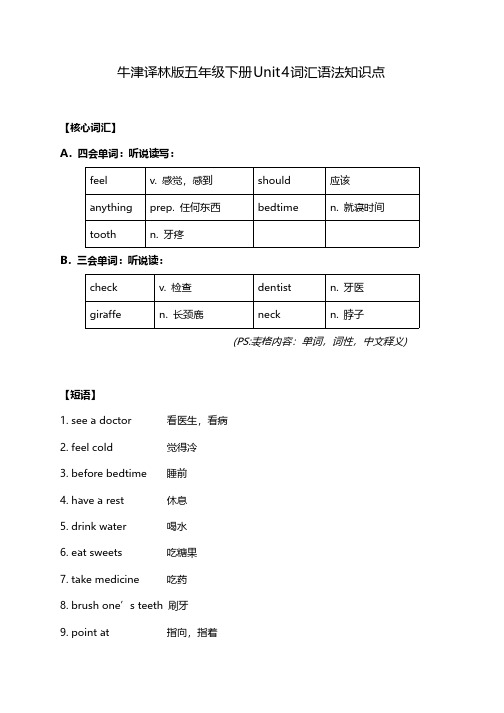
牛津译林版五年级下册Unit4词汇语法知识点【核心词汇】A.四会单词:听说读写:feel v.感觉,感到should应该anything prep.任何东西bedtime n.就寝时间tooth n.牙疼B.三会单词:听说读:check v.检查dentist n.牙医giraffe n.长颈鹿neck n.脖子(PS:表格内容:单词,词性,中文释义)【短语】1.see a doctor看医生,看病2.feel cold觉得冷3.before bedtime睡前4.have a rest休息5.drink water喝水6.eat sweets吃糖果7.take medicine吃药8.brush one’s teeth刷牙9.point at指向,指着10.have a headache头疼11.let me check让我检查一下12.have a fever发烧13.have a toothache牙疼14.see the dentist看牙医15.eat a lot of sweets吃很多糖果16.eat ice cream吃冰淇淋17.drink warm water喝温水18.brush teeth before bedtime睡前刷牙齿19.in the hospital在医院里20.a long neck长脖子【重点单词和短语拓展】1.feel:a.常用短语:feel hungry感觉饿了,feel thirsty感觉渴了,feel cold感觉冷,feel ill感觉不舒服,感觉生病了(feel+形容词adj.)e.g.:Do you feel hot?你感觉热吗?2.check:a.作及物动词时,check+sth.检查某物;b.作为不及物动词时,常用短语:check in登记e.g.:Now listen to the tape and check your answers.现在听录音并检查你的答案。
五年级下英语:一般现在时及习题

五年级下册英语重点语法解析:一般现在时小学五年级英语下册有三大重点语法:一般现在时、一般进行时、一般将来时。
这三大时态是我们学好英语的基础,必须要牢牢掌握。
助手将和大家详细解析以上三大时态的用法,今天我们先来学习“一般现在时”。
一般现在时是小学英语的重要语法知识点,也是上了初中后要学习的最重要的语法内容之一。
一般现在时主要用来表示经常性或习惯性的动作,或者是现在的特征或所处的状态。
一般现在时看似最简单,其实它和其它时态最不一样。
其它时态说的都是具体时间发生的具体事件,而一般现在时强调的是一段时间内的状态或反复发生的动作,即客观事实。
1. 谓语是be(am/is/are)的一般现在时。
①肯定形式:主语+be+表语(形容词、名词充当表语)。
I am hungry.You are beautiful.He is a doctor.②否定形式:主语+be+not+表语(形容词、名词充当表语)。
I am not hungry.You aren't beautiful.He isn't a doctor.③一般疑问句形式:Be+主语+表语(形容词、名词充当表语)? 肯定回答:Yes,主语+be. 否定回答:No, 主语+ be+not.—Are you hungry?—Yes,I am./No,I'm not.—Is he a doctor?—Yes, he is./No, he isn,t.④特殊疑问句形式:特殊疑问词+Be开头的一般疑问句?—What is he?—He is a doctor.注意:be要随着主语变。
2. 谓语是情态动词can/may.....+动词原形的一般现在时。
①肯定形式:主语+情态动词can/may.....+动词原形+宾语。
I can finish my homework.②否定形式:主语+情态动词can/may.....+not+动词原形+宾语。
I can't finish my homework.③一般疑问句形式:情态动词Can/May.....+主语+动词原形+主语+宾语。
英语五年级下册第一单元语法

英语五年级下册第一单元语法以下是英语五年级下册第一单元的语法知识点:1. 现在进行时:表示正在进行的动作或正在发生的事情。
结构:be动词(am/is/are)+动词ing例子:I am playing football.(我正在踢足球。
)2. 动词ing形式:表示正在进行的动作,常与be动词一起使用。
结构:动词+ing例子:running(跑)3. 特殊疑问句:用来对某一事物或情况进行提问。
结构:特殊疑问词+be动词/助动词+主语+动词ing例子:What are you doing?(你正在做什么?)4. 祈使句:表示请求、命令或建议。
结构:动词原形+宾语+其他成分例子:Please help me.(请帮我。
)5. 形容词的比较级和最高级:表示两个或多个事物之间的比较关系。
结构:形容词比较级+than+比较对象形容词最高级+of/in+范围例子:This book is more interesting than that one.(这本书比那本书更有趣。
)The most beautiful place in the world is the Amazon rainforest.(世界上最美丽的地方是亚马逊雨林。
)6. 序数词:表示事物的顺序。
结构:基数词+序数词后缀例子:the first day(第一天)7. 时间表达法:表示具体的时间。
结构:小时+分钟/秒钟例子:at 3:15(在3点15分)8. 介词:表示事物之间的位置关系。
结构:介词+名词/代词例子:in the morning(在早上)9. 副词:修饰动词、形容词或整个句子,表示动作的方式、程度或时间等。
结构:副词+动词/形容词/句子例子:beautifully(漂亮地)。
译林版五年级英语下册Unit 3 Asking the way重点语法、 基础知识整理
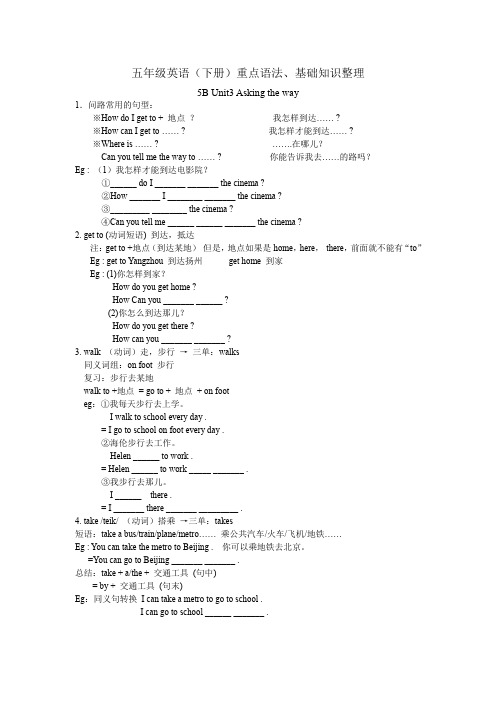
五年级英语(下册)重点语法、基础知识整理5B Unit3 Asking the way1.问路常用的句型:※How do I get to + 地点?我怎样到达…… ?※How can I get to …… ? 我怎样才能到达…… ?※Where is …… ? …….在哪儿?Can you tell me the way to …… ? 你能告诉我去……的路吗?Eg : (1)我怎样才能到达电影院?①______ do I _______ _______ the cinema ?②How _______ I ________ _______ the cinema ?③_________ ________ the cinema ?④Can you tell me ______ ______ _______ the cinema ?2. get to (动词短语) 到达,抵达注:get to +地点(到达某地)但是,地点如果是home,here,there,前面就不能有“to”Eg : get to Yangzhou 到达扬州get home 到家Eg : (1)你怎样到家?How do you get home ?How Can you _______ ______ ?(2)你怎么到达那儿?How do you get there ?How can you _______ _______ ?3. walk (动词)走,步行→三单:walks同义词组:on foot 步行复习:步行去某地walk to +地点= go to + 地点+ on footeg:①我每天步行去上学。
I walk to school every day .= I go to school on foot every day .②海伦步行去工作。
Helen ______ to work .= Helen ______ to work _____ _______ .③我步行去那儿。
五年级英语下册知识点

五年级英语下册知识点上学期间,很多人都经常追着老师们要知识点吧,知识点是传递信息的基本单位,知识点对提高学习导航具有重要的作用。
想要一份整理好的知识点吗?下面是店铺整理的五年级英语下册知识点汇总,欢迎大家借鉴与参考,希望对大家有所帮助。
一、重点单词用法1. call v. 称作 What do you call it in English?2. like v. 喜欢sth. I like English very much.like to do sth. I like reading very much, but I don’t like to read now.doing sth.3. let’s + 动词原形Let’s (=let us) make animals. let sb. do sth. 让某人做某事4. want v. 想,想要want sth. I want a piece of paper.to do sth. I want to watch TV.5. 情态动词情态动词很简单,没有人称数之变,动词原形后边站,can表能力may许可should应该would愿must必须,否定needn’t换have to不得不表客观二、重点语法A) 一般现在时1. 概念:一般现在时表示经常的、习惯性的动作或存在的状态。
2. 构成:一般现在时的构成主要有两种形式:(1)be型:句子的谓语动词只有be(am,is或are):a.肯定句中,只出现be,如:I am a student.我是一名学生。
b.否定句中,要在be后面加not,如:She isn't a teacher.她不是教师。
c.一般疑问句,要将be放在句子开头(注意句首字母大写),句尾用问号,答语用Yes,主语+be.或No,主语 + be + not.如:—Are you ready?—你准备好了吗?—Yes,I am.—是的,我准备好了。
小学五年级下册英语重点句型(Unit2~Unit5)

【导语】英语的基础就是从单词起步到句⼦,所谓的句⼦练习,它包含了你对单词的认知,包含了你对语法知识点的认知,包含了你⼝语能⼒的认知,句⼦练习可以让你知道,⽤英语思维说话是什么样的。
以下是⽆忧考整理的《⼩学五年级下册英语重点句型(Unit 2~Unit 5)》相关资料,希望帮助到您。
⼩学五年级下册英语重点句型(Unit 2) Unit 2 重点句型: 1.What’s your favourite season? 你最喜爱的季节是什么? 2.What’s the weather like in spring?It’s sunny and warm. 春天的天⽓像什么样⼦?⼜晴朗⼜暖和。
3.Which season do you like best?Winter. I can make a snowman. 你最喜欢哪个季节?冬天,我可以堆雪⼈。
4.I can play with snow. 我可以玩雪。
5.Winter is beautiful, but it’s too cold for me. 冬天时美丽的,但是对我来说太冷了。
6.Why do you like winter?Because I can sleep a long time. 你为什么喜欢冬天?因为我可以睡懒觉。
7.When is the best time to go to Beijing? Fall. 去北京的时间是什么时候?秋天。
8. What is the weather like in fall in Beijing? It’s sunny and cool. 北京秋天的天⽓像什么样⼦?⼜晴朗⼜凉爽。
9.What can I do there?You can go to the Great Wall. 我可以在那⾥做什么?你可以去长城。
10.Spring is from March to May. 春天从三⽉到五⽉。
牛津译林版五年级下册英语语法人称代词主格宾格讲解
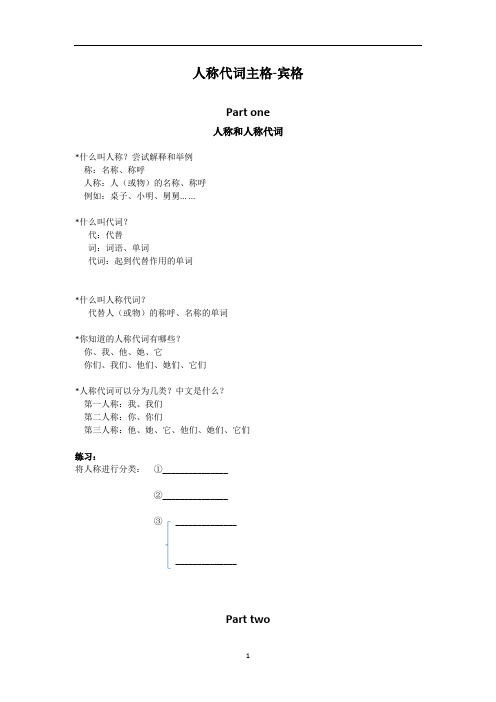
人称代词主格-宾格Part one人称和人称代词*什么叫人称?尝试解释和举例称:名称、称呼人称:人(或物)的名称、称呼例如:桌子、小明、舅舅... ...*什么叫代词?代:代替词:词语、单词代词:起到代替作用的单词*什么叫人称代词?代替人(或物)的称呼、名称的单词*你知道的人称代词有哪些?你、我、他、她、它你们、我们、他们、她们、它们*人称代词可以分为几类?中文是什么?第一人称:我、我们第二人称:你、你们第三人称:他、她、它、他们、她们、它们练习:将人称进行分类:①_______________②_______________③____________________________Part two人称代词主格*人称代词主格中的主格怎么理解?主:主人格:格式主格:主人的格式(在句子中做主人的角色)位置特点:所以一般放在句子的开头例如:I’m a student.*人称代词主格相对应的英文有哪些?第一人称:I we第二人称:you you第三人称单数:he she it第三人称复数:they思考:为什么第三人称的主格的单数和复数要分开来讨论呢?--在一般现在时中,不管第一人称主格、第二人称主格是单数还是复数,后面的动词都是用原形;而第三人称主格是复数时,后面的动词要用原形,但是第三人称主格是单数时,后面的动词要用三单的形式(即:三单对三单)练习:将下列人称或人称代词的主格归类并写入括号内:the students , I , Daniel and Tommy , these dogs , Nick , the girl , they , you , she and I , this cat , a monkey and a tiger , he , my aunt , it , she ,those pens第___人称:( )第___人称:( )第__人称____数:( )第__人称____数:( )Part three人称代词宾格*代词宾格中的宾格怎么理解?宾:宾客格:格式宾格:宾客的格式(在句子中做宾客的角色)位置特点:所以放在句子当中(宾客需要由主人引领,所以主人要站在前面领路)具体位置:宾格放在介词和动词的后面例如:Look at me.See you.Let’s go (let’s =let us)*人称代词宾格相对应的英文有哪些?第一人称:me us第二人称:you you第三人称:him her itthem注意:You和it的主格和宾格长的一模一样me\him\them 都有m最为特殊的就是us\her需要牢记Part four人称代词的排序*如果同时出现几个人称代词主格并列作主语,应该怎么排序呢?1)单数人称代词并列作主语时,其顺序为:第二人称-> 第三人称-> 第一人称you -> he/she/it -> I例如:You,he and I should return on time.思考:为什么要这么排序呢?--为了体现绅士风度,谦让有礼貌2) 复数人称代词作主语时,其顺序为:第一人称-> 第二人称-> 第三人称we->you->they记忆技巧:不管是单数还是复数,都是第二人称排在第三人称的前面只是调换了第一人称的位置。
- 1、下载文档前请自行甄别文档内容的完整性,平台不提供额外的编辑、内容补充、找答案等附加服务。
- 2、"仅部分预览"的文档,不可在线预览部分如存在完整性等问题,可反馈申请退款(可完整预览的文档不适用该条件!)。
- 3、如文档侵犯您的权益,请联系客服反馈,我们会尽快为您处理(人工客服工作时间:9:00-18:30)。
一、词语1、名词这里强调两点:不可数名词都默认为单数,所以总是用is 名词复数如何加后缀:各种不同情况变化方法例词一般情况: 1)直接加-sbook-books bag-bags cat-cats bed-beds 以s. x. sh. ch2)结尾加-esbus-buses box-boxes brush-brusheswatch-watches peach—peaches glass--glasses3)以“辅音字母+y”结尾变y为i, 再加-esfamily-families study--studies4)以“f或fe”结尾 ,变f或fe为v,再加-esknife-knives不规则名词复数man-men woman-women policeman-policemen policewoman-police women mouse-mice foot-feet child-children fish-fish Chinese-C hinese英语下册知识点总结一、重点短语讲解1.play with 和…一起玩,play with sb.(某人)和…一起玩,play with sth.(某物)玩某物eg. Lucy and Lily are playing with their mother.Lucy and Lily are playing with their doll.2.a lot of 很多a lot of =lots of+可数名词复数或不可数名词eg. 同义句转换There are a lot of apples on the table.=There are apples on the table.3. how often 多久一次,how often 是一个特殊疑问词,就频率提问。
英语表示频率的词:一次:once 两次:twice 特殊其他次数:基数词+times 构成例如:8次eight timese.g. --How often do you go to the library?I go to the library once a week.(注:如就划线部分提问,应用特殊疑问词how often)4.how many 多少,how many/much 就数量提问.how many+可数名词;how much +不可数名词e.g.-- How many boys are there in your class?There are 40 boys in my class.How much water is there in the bottle? There is a little water in the bottle.5.be good at擅长at后可加名词或动词。
如加动词,应用动名词形式即:v + ing e.g.I am good at English.6.be interested in对….感兴趣in后可加名词或动词。
如加动词,动词应用动名词形式即:v + ing e.g. I am interested in English .7.play the violin拉小提琴,乐器前加定冠词the8.listen to music听音乐, 听…,用listen to1)听音乐前不加定冠词the;2) 听收音机前,要加定冠词the :listen to the radio .e from 来自,come from=be from ,I come from China. =I am from China.易错点:Where are you come from? (错误) Where do you come from? (正确)10. play football 踢足球{球类名词前不加冠词}11.be famous for因…闻名12. have a look at 看一看have a look at =look at13.how much 多少(钱),how much 用来询问价格14.a pair of 一双,一对;a pair of glasses, a pair of trousers15. try on 试穿试穿鞋子try on the shoes=try the shoes on; 试穿它,此处它是代词,只能放在try on之间try it on16.see a doctor看医生常用表示“看”的单词有:watch; see; look; read ;watch:用于看电视,比赛等;watch TV, watch football match see: 看见强调结果,看到什么;看电影、看医生时用see a film; see a doctor17. take good care of好好照顾take (good) care of=look after18. have a fever发烧have +表示症状的单词have a fever; have a toothache; have aheadachehave +病名have measles (麻疹) have mumps (腮腺炎)19. have to不得不Eg: Her mother is ill, she has to look after her mother, so she can’t come to the party.重点:含有have to的句子变否定用don’t doesn’te.g. She has to finish her homework.变否定句为:She doesn’thave to finish her homework. (正确)20. worried about 担心She worried about her exam.21.help with帮助…做某事help with =help sb (to) do sth.Eg: Peter helps her mother with the housework .=Peter helps her mother (to) do the housework.二、重点单词用法1.call v称作What do you call in English?2.Like v 喜欢1)like sth. I like English very much2)like to do sth.I like reading very much, but I don’t like toread now.3)like doing sth. 动词原形3.let’s +动词原形Let’s (=let us) make animals. let sb. do sth. 让某人做某事4.want想,想要1)want sth. I want a piece of paper.2)want to do sth. I want to watch TV.5.情态动词情态动词很简单,没有人称数之变,动词原形后边站。
can 表能力;may许可;should 应该;would 愿;must必须,否定needn’t 换have to不得不表客观三、重点语法A)一般现在时1.概念:一般现在时表示经常性、习惯性的动作或存在的状态。
2.构成:有两种构成形式(1)b e 型句子的谓语动词只有be(am,is,are)a 肯定句中,只出现be :I am a student.我是一名学生。
b.否定句中,要在be 后面加not,如:She isn't teacher.她不是教师。
c.一般疑问句中,要将be 放在句子开头(注意句首字母大写),句尾用问号,答语用Yes,主语+be.或No,主语+be +not如:Are you ready?—你准备好了吗?—Yes,I am.—是的,我准备好了。
No, I’m not. 我没准备好。
)(2)实义动词型:句中的谓语动词为实义动词(也叫行为动词):a.肯定句中,只出现实义动词,如:I get up in the morning.我早晨起床。
b.否定句中,要在实义动词前面加do(does)+not,do(does)作助动词,本身无意义,常与not 缩写成don't (doesn't),如:I don't like vegetables.我不喜欢蔬菜。
c.一般疑问句,要在句子开头加助动词Do(does),句尾用问号,简略答语用Yes,主语+do(does).或No,主语+do(does)+not.如:—Do you like oranges?—你喜欢桔子吗?—Yes,I do.—是的,我喜欢。
3一般现在时的用法1)经常性或习惯性的动作,常与表示频繁度的时间状语连用。
时间状语:every…, sometimes,Eg:I leave home for school at 7 every morning.2)客观真理,客观存在,科学事实。
The earth moves around the sun.Shanghai lies in the east of China.3)表示格言或警句中。
Pride goes before a fall.骄者必败。
注意:此用法如果出现在宾语从句中,即使主句是过去时,从句谓语也要用一般现在时。
例:Columbus proved that the earth is round .3)现在时刻的状态、能力、性格、个性。
I don't want so much.Ann Wang writes good English, but does not speak well.B)一般将来时1.概念:表示将要发生的动作或存在的状态及打算、计划或准备做某事。
句中一般有以下时间状语:tomorrow, next day(week, month, year…),soon, the day after tomorrow(后天)等。
2.基本结构:①be going to+ do.②will+do3.否定句:在be动词后面加not或在will后面加not 成won’t。
例如:I’m going to have a picnic this afternoon.否定句为:I am not going to have a picnic this afternoon.4一般疑问句:be或will 提到句首,some改为any, 改为or,第一二人称互换。
例如:We are going to go on an outgoing this weekend. Are you going to go on an outgoing this weekend?四、对划线部分提问。
